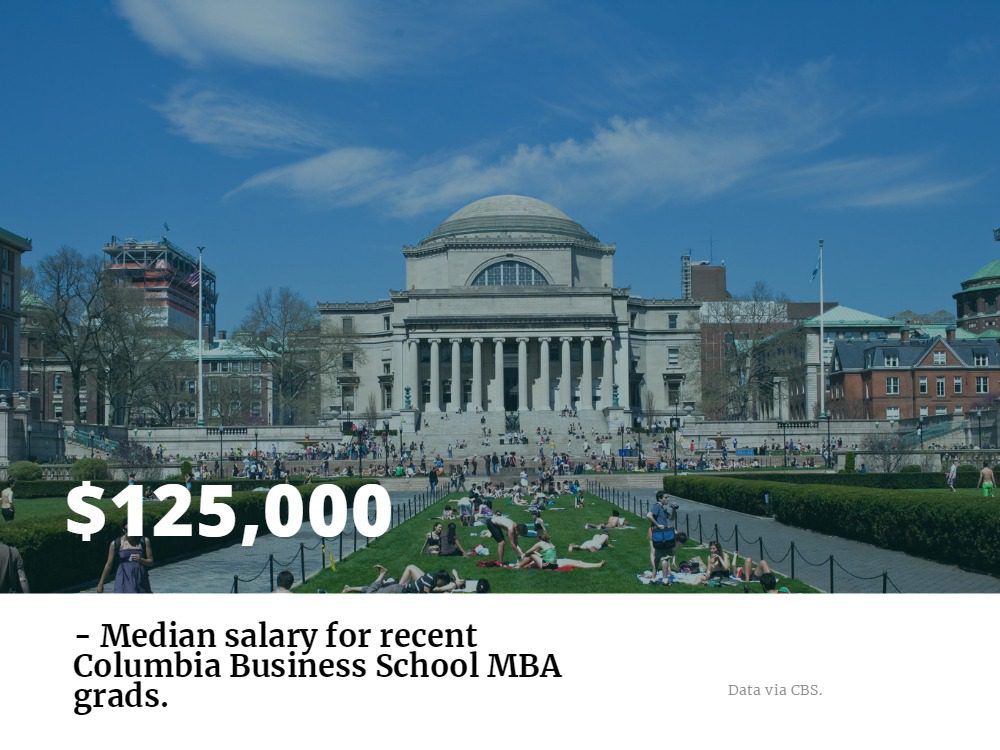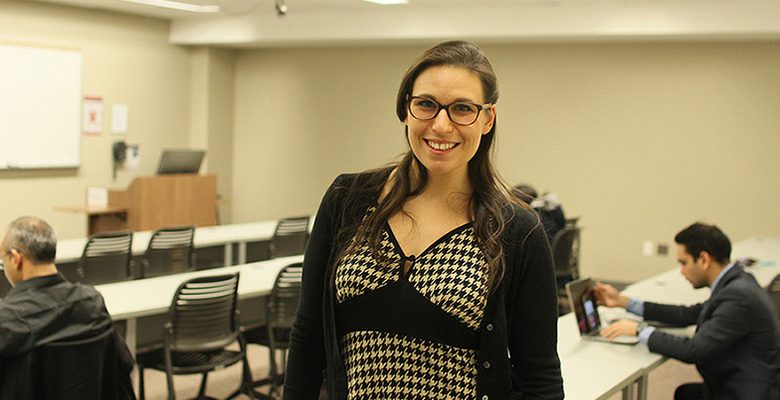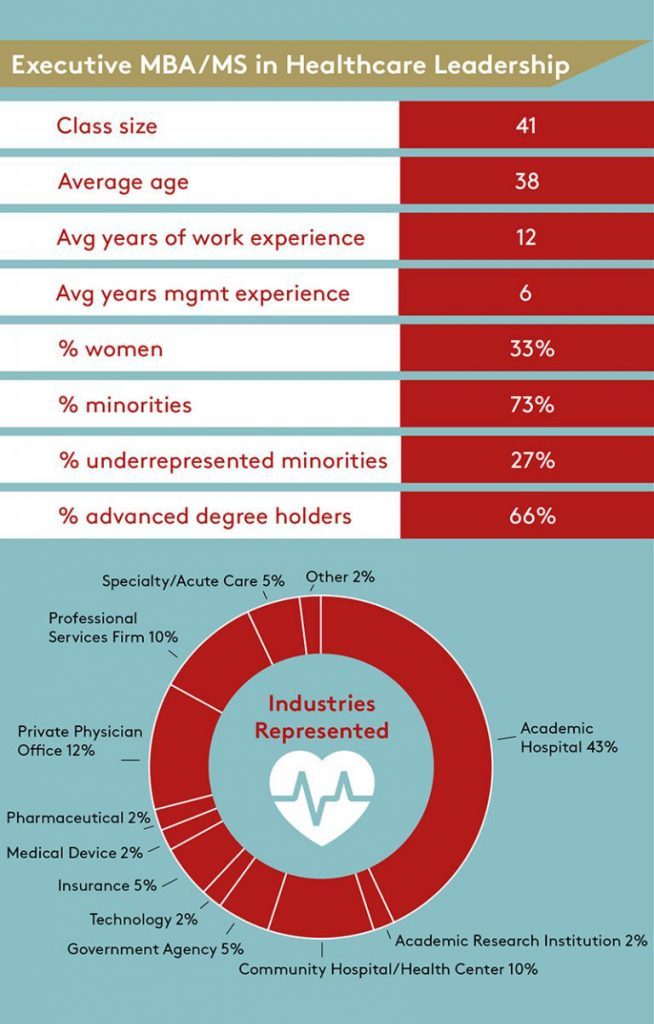A Look At New York’s Best Real Estate MBA Programs

In 2017, the United States Commercial Real Estate Services group (CBRE), listed New York City’s real estate investments markets among the three largest in the world, sandwiched between Tokyo and Los Angeles. This makes New York City the perfect place to learn about the multi-faceted, constantly-evolving field of real estate. For aspiring MBA’s interested in pursuing real estate, we’ve laid out some of the best New York real estate MBA programs the metro has to offer.
The Best New York Real Estate MBA Programs
Columbia Business School
The oft-celebrated Columbia Business School MBA Real Estate Program emphasizes finance and investment management, headquartered at the Paul Milstein Center for Real Estate. There, according to the school, students will gain an education focused on “capital markets, entrepreneurship, and global business.” Since many of Columbia’s alumni remain in New York metro, the school has access to a large network of professionals to engage in speaking events, panels, and mentorship with current students. Students in this program must take Real Estate Finance, which the school considers the Real Estate program entry course. Students then take nine credits of real estate electives.
The Real Estate Private Equity class lets students gain real-world experience. Groups of students work with industry sponsors to develop a business plan and present their final projects to a panel of professionals. Given the hands-on private equity and investment experience provided by this course, it makes sense that in 2017, 46 percent of students who graduated from the MBA Real Estate program went on to careers in Investment Management/Private Equity.
Nearly 4 percent of the most recent MBA class from CBS entered the New York real estate industry, earning a median income of $120,000 per year and, of course, heavy amounts of extra compensation. These graduates earned positions at notable real estate firms, such as: Drake Real Estate Partners, GLL Real Estate Partners, Greystar Real Estate Partners, LLC, Summit Real Estate Group, LLC, TKF Real Estate Investment LLC, and Trilogy Real Estate Management.

SC Johnson Graduate School of Management – Cornell University
At the Cornell University SC Johnson Graduate School of Management, students can pursue a dual degree in real estate and business administration. The MPS in Real Estate/MBA is a collaboration between Cornell SC Johnson’s School of Hotel Administration and Johnson. The dual degree spans six semesters (three years), and includes two summer internships. The first year of the degree is in either the real estate program or the MBA program, but students can take courses in both programs in the following semesters.
Students pursuing real estate at Cornell benefit from access to the the Cornell Real Estate Council, which the school promotes as “one of the largest university-based networks of real estate professionals in the world.”
YOU MAY ALSO LIKE: Finding the Best Real Estate MBAs in Los Angeles
Rutgers Business School, Newark and New Brunswick
The Real Estate Concentration at the Rutgers Business School in Newark and New Brunswick, New Jersey, has several objectives. The curriculum is geared toward arming students with the ability to assess investment risks in real estate markets, determine the best way to utilize a property based on market and demographic information, and gain a thorough knowledge of the legal intricacies involved in real estate. In addition to their elective and core MBA courses, b-schoolers with a real estate concentration are required to take the following courses: Aggregate Economic Analysis, Real Estate Development, Real Estate Law, and Real Estate Finance.
Stern School of Business – New York University
Any discussions of the best business schools in New York metro, and perhaps the world, are likely to include mention of the NYU Stern School of Business. Stern’s MBA with a Real Estate Specialization helps students understand the intricacies of real estate markets, financing real estate projects, real estate development, and managing real estate investments. The curriculum includes courses like: Real Estate Development and Entrepreneurship, Urban Systems, and Real Estate Investment Strategies.
One major perk of Stern’s program is its flexibility; Stern MBA’s can select up to three specializations, so students are not limited by their choice. Real estate is a vast field, with a multitude of facets. MBA’s interested in New York real estate might choose a secondary specialization to complement their specific interests, such as entrepreneurship and innovation or marketing.
NJ Monthly Mag Highlights Rutgers EMBA Doctors, and More – New York City News

Let’s explore some of the most interesting stories that have emerged from New York City business schools this week.
NJ Monthly Mag Highlights Rutgers EMBA Doctors – Rutgers Business Blog
According to stats released by Rutgers Business School, it’s not uncommon to find between 1-5 doctors in a typical EMBA class. This is largely due to the new reality of the medical profession, which has increasingly required that doctors “transition from medical practice to running hospitals, managing hospital finances, heading-up HMOs, working for pharmaceutical companies and becoming Chief Medical Officers.”
Three Rutgers EMBA Doctors made New Jersey Monthly Magazine’s annual “Top Doctors” list:
- Clifford Sales, a vascular surgery specialist at Overlook Medical Center
- Eric Seaman, a male infertility specialist at the Urology Group of New Jersey
- Jacqueline Williams-Phillips, the medical director of the Pediatric Intensive Care Unit at Bristol-Myers Squibb Children’s Hospital at Robert Wood Johnson University Hospital in New Brunswick and associate professor of Pediatrics at UMDNJ-Robert Wood Johnson Medical School.
Learn more about these EMBA Superstar Doctors here.
Patagonia Exec Talks ‘Fast Fashion,’ Fair Trade, and What It Means to Be A Responsible Company – Gabelli Connect
The Gabelli School of Business‘ Center for Humanistic Management recently hosted a guest lecture from Vincent Stanley, the Patagonia director of philosophy, in which he talked about how corporate responsibility has directly shaped the company’s business.
“One of our big concerns is how we look at the challenges of the planet and ensure that our company is not contributing to those challenges and instead contributing to the solutions. Nature is not just where we go to play. The health of our natural systems underlines all of our social and industrial systems, even in this tiny little town where we were based.”

Vincent Stanley, Patagonia director of philosophy / Photo via fordham.edu
You can read more about Stanley’s lecture here.
Can Stevens Students Create a Cryptocurrency Exchange? Bank on It – Stevens Institute of Technology SOB Blog
A team of Stevens Institute of Technology School of Business seniors recently announced its plans to unveil Coin Complex, a cryptocurrency exchange designed to address and improve upon the limitations of the current trading options, at the May 2 Innovation Expo. George Engroff, a senior finance major who recently completed a summer internship with Credit Suisse, elaborates: “The exchanges I was using were completely inadequate—none of them gave you a good understanding of the market and your portfolio. So I thought, here at Stevens, we have a lot of smart people and innovators—I’m sure we could make a better exchange than what’s out there.”

The Coin Complex login / Photo via Tom Braunck
You can find out more about Coin Complex here.
Cornell’s Business Impact Symposium Returns, and More – New York News

Let’s explore some of the most interesting stories that have emerged from New York City business schools this week.
Cornell Business Impact Symposium: Bridging Sustainability and Enterprise – Johnson Business Blog
Cornell’s SC Johnson Graduate School of Management Center for Sustainable Global Enterprise hosted this year’s Cornell Business Impact Symposium (CBIS), which featured sustainability experts from the food, fashion, technology, and finance industries. Current MBA students shared their takeaways from the symposium on the Johnson Business Blog.
René Bonomi, MBA ’19, cited the “Combating Climate Change with Clean Energy Innovations” panel as a highlight, which surveyed “trends in the energy industry, such as storage improvement, and illuminating innovative start ups such as Dimensional Energy and Energy.”
Sarah Theobald, MBA ’19, was struck by the “From Fashion to Food: Excursions through Sustainable Supply Chain” panel, which “covered an array of hot topics from supply chain traceability and upcycling to the challenges of measuring social impact as well as reconciling emerging market manufacturing practices with United States corporate standards.”

Left to right; Martie Curran (Nestle Waters), Funlola Otukoya (CDP), Eileen Quigley (NRDC), Michael Van Brunt (Covanta Energy), and Jim Armstrong (Climate Changers) / Photo via johnson.cornell.edu
Read more about this year’s CBIS here.
Podcast: Mark Conrad on the Business of Sports – Gabelli Connect
The American sports industry, somehow, is becoming a bigger monolith than ever before. In fact, Forbes projects the professional sports market in the United States to grow from $60 billion to $73 billion by 2019.
Recently, Fordham University Gabelli School of Business associate professor and sports business concentration director Mark Conrad was a featured guest on a Fordham-produced podcast to discuss his organizational predictions for the NFL, Major League Baseball, and NCAA.
You can listen to the interview with Conrad below and find out more here.
A Summer Class Set in Israel – Rutgers Business School Blog
Rutgers Business School Entrepreneurship professor Gary Minkoff has spearheaded a three-week long summer course entitled Doing Business in Israel, which will “introduce students to the entrepreneurial culture and business world inside Israel,” including local Israeli aerospace, artificial intelligence, biometrics, clean technology cybersecurity, pharmaceutical engineering, robotics, and venture investment industries.
“We’re teaching entrepreneurship and innovation, so why not connect students with places where that’s happening. This course aims to plant many seeds for potential collaborations between Rutgers students and Israeli entrepreneurs and innovators,” Minkoff said.
You can learn more about the course here.
How a Rutgers Part-Time MBA Led to a Dream Job, and More – New York News

Let’s explore some of the most interesting stories that have emerged from New York City business schools this week.
Part-Time MBA Proves to be a Steppingstone to Dream Job – Rutgers Business School
From running phone sales in Manhattan, to working her way up the corporate business to business ladder, Allegra Kipnis, a part-time MBA candidate from the Rutgers Business School in New Brunswick, found her “dream job.”
In a recent profile with the school, Kipnis divulged that earning her MBA helped her earn multiple promotions with Verizon. But, even after being let go, she (with the help of the Rutgers community) helped her refine her career path on the way to a dream role with Panasonic as an internal communications specialist.
“The MBA program gave me the tools I needed to eventually land my dream job, but funny enough, after all I had learned, it turned out to be just one more step in the story of my career,” she said in the interview.

Kipnis, a part-time MBA candidate at Rutgers / photo via Rutgers.edu
You can more about Kipnis’ career path and the Rutgers Business School part-time MBA program here.
A Combination of Personality Traits Might Make You More Addicted to Social Networks – Binghamton School of Management
The Binghamton University School of Management recently published new research, “Personality Predictors of IT Addiction,” in which assistant professor of management information systems Isaac Vaghefi, along with DePaul’s Hamed Qahri-Saremi, examined which collection of personality traits often leads to social networking addiction among 300 college-aged students: neuroticism, conscientiousness, and agreeableness. Vaghefi writes:
“It’s more of a holistic approach to discover what kind of people are more likely to develop an addiction. Rather than just focusing on one personality trait, this allows you to look at an all-inclusive personality profile.”
Read more about the duo’s research here.
Admissions Bridge Connects Diverse Undergraduates to MBA Possibilities – Johnson School of Management Feed
The SC Johnson School of Management blog recently published an overview of the school’s second annual Johnson Admissions Bridge—an event that encourages “undergraduate women and students from underrepresented backgrounds at Cornell to consider business school and discover ways to begin preparing now.”
The Bridge is “part of a larger initiative to ensure a diverse population is offered the opportunity to attend business school.” Judi Byers, executive director of admissions and financial aid at Johnson, explains:
“At Johnson, we have both an opportunity and a responsibility to contribute to the pipeline of diverse talent ultimately seeking entry into top business schools and the companies and organizations they will lead afterward. The Bridge is a way to connect with our undergraduate students here at Cornell and gives us the chance to talk with them about potential career paths and how an MBA might offer value to their short and long term career goals.”
Learn more about the Cornell Bridge here.
The Future of Employment at Philly Business Schools

When considering where to get your MBA, one of the first questions you should ask is, “What will my employment outlook be?” After all, the reason you get an MBA is to improve your career. But what is important when it comes to employment trends at the leading business schools in Philadelphia? There are quite a few different statistics you should look at.
Important MBA Employment Statistics
To choose an MBA program based on your future career success, there are a few questions you need to answer.
- What industry do I want to work in and does the school place a majority of their students in that industry?
- What percentage of students receive and accept job offers? The same for internships?
- Self-employed or entrepreneurship data?
- What salary can I expect?
- Where do most students end up living and work?
- Who are the top employers?
You also want to look at any trends between years. For example, the percentage of students receiving job offers should increase year-over-year. And if you see a shift from the consulting industry to financial services, you want to be aware that the school could be changing its direction.
So, what does employment look like for three of the top Philly business schools?
The Wharton School
At the Wharton School at the University of Pennsylvania, the employment trends year-over-year are fairly consistent. While the percentage of students reporting job offers dropped from 2016 to 2017, part of that reason may be the increased number of students seeking employment (75.2 percent vs. 79.1 percent).
As for the increase in median salary, that can be attributed to inflation as well as an increase in job salary for each industry including professional services rising from $160,000 in 2016 to $180,000 in 2017. The location of jobs also changed slightly between 2016 and 2017, but that could be due to various reasons including the current state of international affairs for the U.S.
| The Wharton School | 2017 | 2016 |
|---|---|---|
| Percentage of students reporting job offers | 97.1 percent | 98.3 percent |
| Percentage of self-employed students or those starting their own business | 4.8 percent | 5.8 percent |
| Median Salary | $130,000 | $125,000 |
| Location Choices | 88.7 percent U.S. 11.3 percent International | 86.9 percent U.S. 13.1 percent International |
As for where MBA students at the Wharton School gain employment, there are a few important notes. The same top three industries—financial services, consulting, and technology—attracted students in both 2016 and 2017. However, the percentages were a little more evenly distributed in 2017. As for the companies hiring students, most of the same companies showed up each year.
| Top Three Industries | Percentage of Students (2017) | Percentage of Students (2016) | Companies Employing Two or More Students (2017) |
|---|---|---|---|
| Financial Services | 32.7 percent | 35.1 percent | Barclays, CITI, and HSBC |
| Consulting | 28.3 percent | 26.6 percent | A.T. Kearney, McKinsey & Company, and Boston Consulting Group |
| Technology | 16 percent | 12.6 percent | Adobe Systems, Amazon, and IBM |
Penn State Smeal College of Business
Pen State’s Smeal College of Business is consistent year-over-year in regards to its MBA employment trends. The percentage of student reporting and accepting job offers increased between 2016 and 2017 from 88.9 percent to 91.5 percent. However, the median salary stayed consistent at $105,000, and the hiring trend of most MBA students staying in the U.S. also remained the same.
| Penn State Smeal College of Business | 2017 | 2016 |
|---|---|---|
| Percentage of Students Reporting Job Offers | 91.5 percent | 88.9 percent |
| Median Salary | $105,000 | $105,000 |
| Location(s) | 98 percent U.S. 2 percent International | 96.5 percent U.S. 3.5 percent International |
As for where MBA students at Smeal College gain employment, there are a few important notes. While the same industries made the top four each year, where they placed changed. In 2016, the top industry was consulting (25 percent) while that changed to manufacturing in 2017 (20 percent). In 2017, retail also moved into tie consulting for the second most sought-after industry, while technology actually decreased year-over-year (23 percent vs. 15 percent).
| Top Four Industries | Percentage of Students (2017) | Percentage of Students (2016) | Companies Hiring |
|---|---|---|---|
| Consutling | 18.5 percent | 25 percent | Deloitte, EY, and PricewaterhouseCoopers |
| Technology | 15 percent | 23 percent | Amazon, Apple, and Dell |
| Manufacturing | 20 percent | 14 percent | Amphenol Corp, CHEP, International Inc. |
| Retail | 18.5 percent | 14 percent | Anheuser-Busch, Proctor & Gamble, and Johnson & Johnson |
Rutgers Business School, Camden
In 2017, the Financial Times ranked the Rutgers MBA as the best program for MBA employment across Big 10 schools. In 2016, Bloomberg Businessweek also ranked Rutgers as the best MBA program for job placement in the U.S. This indicates a relatively steady year-over-year employment trend for MBA students.
As for the median salary of a Rutgers MBA, students in 2017 could expect to earn $95,680. As for the most popular industries, they were:
- Pharmaceutical/Biotech/Healthcare: 46 percent
- Consulting: 13 percent
- Consumer Products: 13 percent
- Other: 14 percent
Bloomberg Businessweek Praises Rutgers, and More – New York News

Let’s explore some of the most interesting stories that have emerged from New York business schools this week.
Bloomberg Ranks Rutgers MBA No. 1 in the Northeast in Job Placement – Rutgers Business Blog
In its “Best Graduate Business Schools of 2017 ” survey, Bloomberg Businessweek ranked Rutgers Business School (Newark, New Brunswick) as the top business school in terms of job placement within the Northeastern United States,. coming in second overall in the United States. Andy Heller, RBS MBA ’11 and current senior associate director of payor and health system marketing at Boehringer Ingelheim sang Rutgers’ praises in terms of preparing him to succeed in the corporate world.
“That kind of experience has helped me each and every day since graduation. Having diverse perspectives on our team ensured that our solutions would be differentiated, yet relevant, and impactful,” Heller notes.
In addition, RBS topped its fellow Big Ten competitors when it came to return on investment, narrowly edging out the University of Iowa College of Business, and Northwestern University’s Kellogg School of Management. The latter of which offered a higher multi-year ROI for potential MBA students, but cost much more in terms of tuition.
Read more about Rutgers’ rankings and accolades here.
Are You a Good Fit for the Executive MBA/MS in Healthcare Leadership Program? – Johnson Business Feed
The Executive MBA/MS in Healthcare Leadership program at Cornell’s SC Johnson School of Management “integrates the general management curriculum of Johnson’s Executive MBA programs with the deep healthcare expertise of Weill Cornell Medicine’s Healthcare Policy and Research Department.” The joint program was developed to “reflect the future of healthcare” and help “sharpen and deepen the skill sets of healthcare professionals through business and healthcare leadership education,” according to the school.
“Today’s healthcare leaders need to be open to knowledge from different vantage points so they can advance progressive healthcare agendas, locally and nationally. Many healthcare leadership programs are exclusively for physicians. However, as we developed this new program, the physicians we spoke to expressed interest in an executive healthcare program that welcomed non-clinicians from different sectors of healthcare—not just practitioners.”
Take a look at the makeup of the Executive program below:

You can read here to learn more about what the program looks for in terms of applicants.
Rewiring Hidden Biases for Better Outcomes – Gabelli Connect
Fordham University’s Gabelli School of Business recently hosted a talk by Harvard professor of social ethics Mahzarin Banaji who unpacked the hidden biases of well-intentioned people—that is, “the beliefs that live in the subconscious and are formulated due to various exposures throughout one’s life.”
Banaji explains:
“A bias is nothing more than a tilting away from neutrality. There’s bias in the mind of the receiver and the applicant. We have to work with the very groups that are holding themselves back and educate those who are holding them back. We are capable of change by how many times we stretch those muscles.”
Learn more about Banaji’s take on unconscious biases here.
